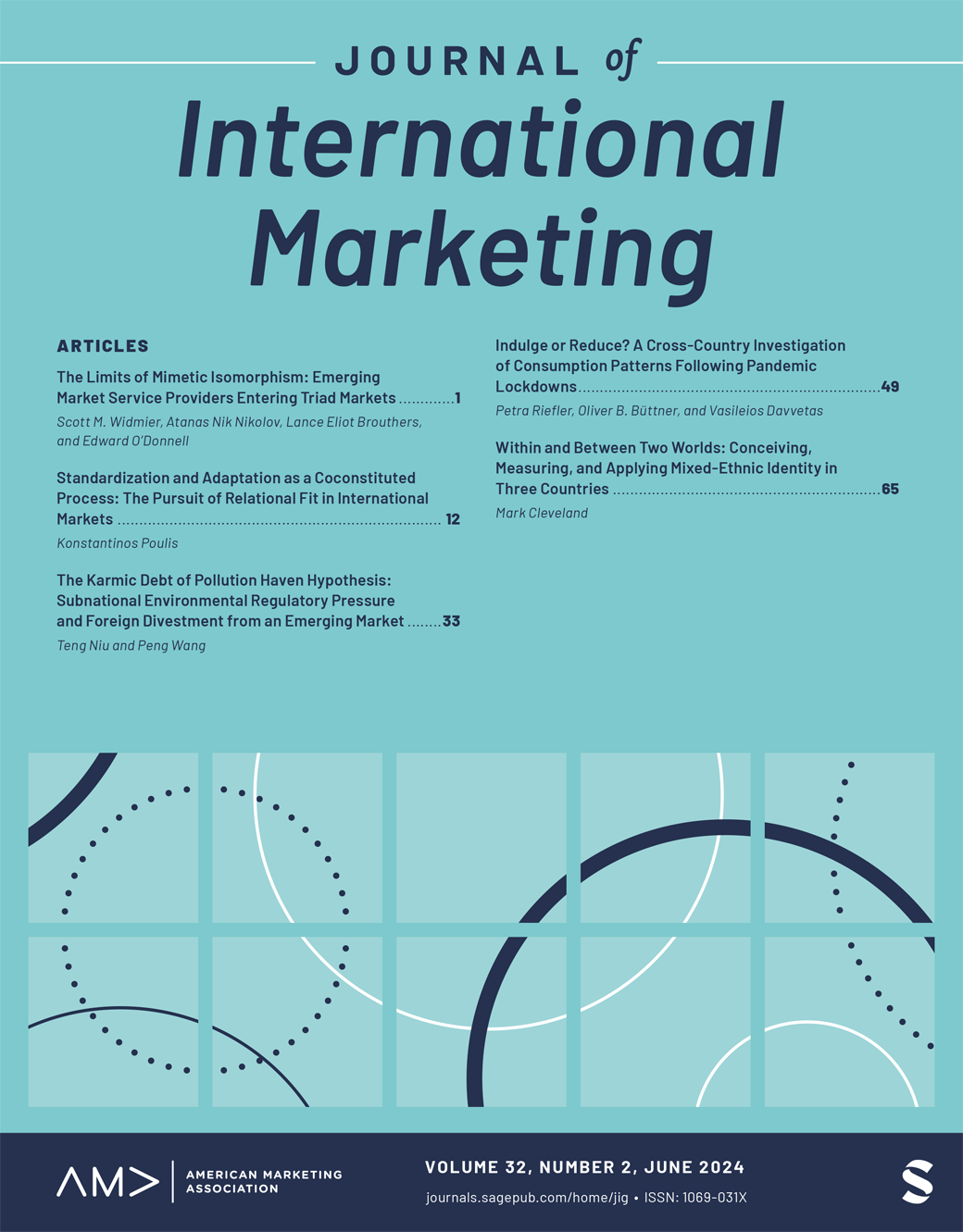Well-Being in a Global World—The Role of International Marketing: An Editorial
IF 4.9
2区 管理学
Q1 BUSINESS
引用次数: 4
Abstract
The notion that marketing can be a force for good has been around for at least five decades (e.g., Kotler and Levy 1969; Kotler and Zaltman 1971), and as marketing scholars, we are proud of the value that marketing can bring to society. However, we often face tough questions regarding marketing’s dark side; is it the discipline that “is used to create and sustain the power of multinational corporations? Promoting the consumerism that is ruining our world? The never-ending advertising efforts to convince people to buy things they do not need?” (Lefebvre 2013, p. 1, preface). Facing growing criticism on the one hand (Kohli and Haenlein 2021; Mende and Misra 2021) and an increased understanding that societies face “grand” societal challenges (such as climate change, diversity and inclusion, and inequality) on the other hand—what has been the marketing scholarly community’s response?While the marketing discipline has begun to address these challenges, this work is still considered a niche rather than mainstream area of investigation. In the top four marketing journals (Journal of Marketing, Journal of Marketing Research, Journal of Consumer Research, and Marketing Science), only 108 (out of 1,088) articles published during 2012–2016 address socially responsible topics (around 10%, compared with 15% at the top management journals; Ozturan and Grinstein 2017). Similarly, an analysis of sustainability-related articles in six marketing journals (the top four plus International Journal of Research in Marketing and Journal of Consumer Psychology) over a ten-year period reveals an average of about two articles per year per journal (Bolderdijk, Grinstein, and Risselada 2022). But things are changing. Mainstream marketing scholars and journals have begun putting society’s most pressing problems front and center. For example, Journal of Marketing’s special issue on “Marketing for a Better World” (Chandy et al. 2021) received 239 submissions, reflecting the growing interest in societal issues. Other examples include the Journal of Consumer Psychology’s special issue on “Consumer Psychology for the Greater Good” (Labroo and Goldsmith 2021) and the Journal of the Academy of Marketing Science’s editorial on responsible research in marketing (Haenlein et al. 2021). The trend reflected in the aforementioned research is important for responsible marketers, consumers, policy makers, and nonprofit organizations, as well as for marketing as a discipline, driving scholars to examine important questions (Kohli and Haenlein 2021). Given this background, what is the role of the international marketing community?We believe the international marketing field is well-positioned to tackle many societal problems. First, most grand societal problems and responses to them are global in nature (Hewett, Okazaki, and Price 2022). Climate change, poverty, health care and education access, social injustice, inequality, immigration, minorities’ rights, corruption, privacy concerns, mental health concerns—these are all challenges faced by governments, citizens and consumers, and for-profit and nonprofit organizations across the globe. Second, collaboration among actors across sectors, industries, and countries is essential to effectively address them. As such, local and global actors as well as national and international institutions must collaborate. While many problems have similar properties, differences across countries and cultures are critical in explaining different interventions and policies, as well as public response and efficacy levels. Finally, the need to account for country and culture differences when addressing grand societal problems as well as the importance of international marketing became clearer during the COVID-19 pandemic, which highlighted the intertwined nature of global and local challenges and interventions. Although we witnessed progress on the study of societal issues in a global context (e.g., special issues in the Journal of International Business Studies [Rodriguez et al. 2006] and Journal of World Business [Shapiro, Hobdari, and Oh 2018]), international marketing is also starting to see its role more fully than before. In recent years, the Journal of International Marketing (JIM) has increasingly published articles addressing business and society (e.g., Heinberg全球化世界中的幸福——国际营销的作用:一篇社论
营销可以成为一种积极力量的概念已经存在了至少50年(例如,Kotler和Levy 1969;Kotler和Zaltman 1971),作为营销学者,我们为营销可以给社会带来的价值感到自豪。然而,我们经常面临关于营销黑暗面的棘手问题;它是“用来创造和维持跨国公司力量的纪律”吗?宣扬正在毁灭我们世界的消费主义?永无止境的广告努力说服人们购买他们不需要的东西?(Lefebvre 2013,第1页,前言)。一方面面对越来越多的批评(Kohli and Haenlein 2021;Mende和Misra 2021),以及对社会面临“重大”社会挑战(如气候变化、多样性和包容性以及不平等)的日益理解,另一方面,营销学术界的反应是什么?虽然市场营销学科已经开始解决这些挑战,但这项工作仍然被认为是一个利基而不是主流的调查领域。在四大营销期刊(Journal of marketing, Journal of marketing Research, Journal of Consumer Research和marketing Science)中,2012-2016年发表的1088篇文章中,只有108篇涉及社会责任主题(约占10%,而顶级管理期刊的这一比例为15%;Ozturan and Grinstein 2017)。同样,对六家营销期刊(前四家加上《国际营销研究杂志》和《消费者心理学杂志》)在十年期间发表的与可持续发展相关的文章的分析显示,每家期刊平均每年约有两篇文章(Bolderdijk, Grinstein, and Risselada 2022)。但情况正在发生变化。主流营销学者和期刊已经开始把社会最紧迫的问题放在前台和中心。例如,Journal of Marketing的特刊“Marketing For a Better World”(Chandy etal . 2021)收到了239份投稿,反映了人们对社会问题的兴趣日益浓厚。其他的例子包括《消费者心理学杂志》关于“消费者心理学为更大的利益”的特刊(Labroo和Goldsmith 2021)和《市场营销科学院杂志》关于负责任的营销研究的社论(Haenlein et al. 2021)。上述研究反映的趋势对于负责任的营销人员、消费者、政策制定者和非营利组织以及作为一门学科的营销都很重要,这促使学者们研究重要问题(Kohli和Haenlein 2021)。在这样的背景下,国际营销界的角色是什么?我们相信国际营销领域有能力解决许多社会问题。首先,大多数重大的社会问题及其应对措施本质上是全球性的(Hewett, Okazaki, and Price 2022)。气候变化、贫困、医疗保健和教育机会、社会不公、不平等、移民、少数民族权利、腐败、隐私问题、心理健康问题——这些都是全球各国政府、公民、消费者以及营利性和非营利组织面临的挑战。其次,跨部门、行业和国家的行为体之间的合作对于有效解决这些问题至关重要。因此,地方和全球行动者以及国家和国际机构必须进行合作。虽然许多问题具有相似的性质,但不同国家和文化之间的差异对于解释不同的干预措施和政策以及公众反应和功效水平至关重要。最后,在2019冠状病毒病大流行期间,在解决重大社会问题时考虑国家和文化差异的必要性以及国际营销的重要性变得更加清晰,这凸显了全球和地方挑战和干预措施的相互交织性。尽管我们目睹了在全球背景下对社会问题的研究取得了进展(例如,《国际商业研究杂志》的特刊[Rodriguez等人,2006年]和《世界商业杂志》[Shapiro, Hobdari, and Oh, 2018年]),国际营销也开始比以前更充分地认识到它的作用。近年来,《国际市场营销杂志》(JIM)越来越多地发表关于商业和社会的文章(如Heinberg)
本文章由计算机程序翻译,如有差异,请以英文原文为准。
求助全文
约1分钟内获得全文
求助全文
来源期刊

Journal of International Marketing
BUSINESS-
CiteScore
8.70
自引率
17.20%
发文量
28
期刊介绍:
As the globalization of markets continues at a rapid pace, business practitioners and educators alike face the challenge of staying current with the developments. Marketing managers require a source of new information and insights on international business events. International marketing educators require a forum for disseminating their thoughts and research findings. Journal of International Marketing(JIM) is an international, peer-reviewed journal dedicated to advancing international marketing practice, research, and theory. Contributions addressing any aspect of international marketing management are published each quarter.
 求助内容:
求助内容: 应助结果提醒方式:
应助结果提醒方式:


